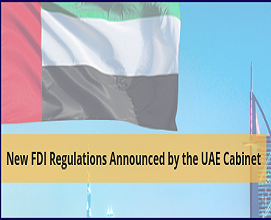New U.A.E. Foreign Direct Investment Law – November 2018
November 30, 2018

The UAE Government has now enacted Federal Decree-Law No. 19 of 2018 (“Foreign Direct Investment Law”) in order to allow foreign investors participation beyond the current restriction of 49%, in restricted to companies operating in certain sectors of the economy.
Until now, foreign investors desiring to form wholly own Companies have been limited to structuring their investment to free-zone registered companies or restricting operations to a branch/representative office.
This Law shall not be applied to projects established in the Financial and non-Financial free- zones in the stock.
The Foreign Direct Investment Law does not allow 100% foreign ownership across all sectors of the economy; in
this regards, the Foreign Direct Investment (FDI) Law introduces a framework under which the UAE Government (acting through a newly formed FDI Unit and FDI Committee, in addition to the existing licensing departments of the Department of Economic Development), may designate certain sectors of the economy as being available to more than 49% foreign ownership. In 2017, the UAE government issued Federal Decree-Law No. 18 of 2017 (an amendment to the UAE Commercial Companies Law) which gave scope to the UAE Cabinet to authorize foreign investors to have an increased shareholding in companies within certain sectors.Foreign Direct Investment Unit and Foreign Direct Investment Committee
The Foreign Direct Investment Law provides, in summary, for the establishment of:
1. By decision of the Ministry of Economy, an FDI Unit, which shall, amongst various responsibilities, be charged with:
- proposing FDI policies, priorities and programmes;
- building a base of investment data and information;
- consolidating and facilitating registration/licensing procedures for FDI projects;
- promoting/advertising the FDI environment;
- preparing periodical reports on the FDI environment in the UAE; and
- attracting FDI to vital/strategic sectors
2. By decision of the UAE Cabinet, an FDI Committee, charged with studying and recommending to the UAE Cabinet, amongst others things:
- a list of economic sectors that may benefit from additional levels of foreign ownership (“Positive List”); and
- adding to the list of sectors that shall not be open to additional levels of foreign ownership (“Negative List”).
Under the Foreign Direct Investment Law, foreign investment may be permitted in those sectors of the economy if do not appear in a ‘negative list’. The UAE Cabinet may add sectors to, or remove sectors from, the ‘negative list’. The sectors of the economy that are listed in the ‘negative list’ in the Foreign Direct Investment Law are:
- Oil exploration and production
- Investigation, security, military (including manufacturing of military weapons, explosives, dress, and equipment)
- Banking and financing activities
- Insurance
- Pilgrimage and Umrah services
- Certain recruitment activities
- Water and electricity provision
- Fishing and related services
- Post, telecommunication and other audio-visual services
- Road and air transport
- Printing and publishing
- Commercial agency
- Medical retail (including pharmacies)
- Blood banks, quarantines, and venom/poison banks
The FDI Law establishes a ‘positive list’ of sectors of the economy in which greater levels of foreign investment will be permitted than what is currently. The Foreign Direct Investment Law does not contain any details as to which sectors of the economy will appear in the ‘positive list’ and grants the UAE Cabinet the authority to issue decisions which add sectors of the economy to the ‘positive list’.
When a sector of the economy is added to the ‘positive list’, the UAE Cabinet may mandate that certain requirements are satisfied by a company or its shareholders before The greater levels of foreign investment will be permitted. By way of example, the UAE Cabinet may:
- mandate the level of foreign ownership permitted in the relevant sector (which could be 100%, but could also be less than 100%);
- put in place restrictions or requirements in respect of the type of legal entity which may carry on The business in the relevant sector;
- apply minimum capital requirements;
- impose Emiratisation requirements; and
- allow greater levels of foreign ownership than is currently the case in specific Emirates (not across the UAE).
At a high level, the Foreign Direct Investment law sets out, the procedure which foreign investors will need to follow in order to apply for permission to take advantage of the increased levels of foreign investment that may be permitted in the sectors of the economy that are listed in the ‘positive list’. An application which is rejected may be appealed under a procedure set out in the Foreign Direct Investment Law.






